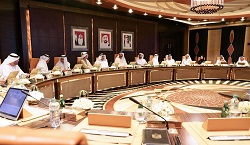Media Center
UAE Cabinet reaffirms that Jerusalem is the essence of regional peace and stability
The UAE Cabinet reaffirmed today that the UAE will remain a firm supporter of the Arab identity of Jerusalem and of the legal status established by all international conventions as well as of the rights of the Palestinian people.
The Vice President, Prime Minister and Ruler of Dubai, His Highness Sheikh Mohammed bin Rashid Al Maktoum, stressed that the status of Jerusalem represents the essence of the peace process, which is the main driver for stability in the region and that any breach of this status may open new doors to extremists. "Jerusalem, with its Arab identity and its historical and religious identity, is a holy land to people of different faiths. The UAE's position is to establish peace principles with the aim of guaranteeing Arab and Palestinian rights and lasting stability in the region," said His Highness.
This came during the UAE Cabinet meeting, presided over by His Highness Sheikh Mohammed bin Rashid. The Cabinet also approved the National Strategy for Higher Education which sets out to build and achieve the highest scientific and professional education standards to serve the UAE’s future generations. "We have come a long way from having 40 university students 46 years ago, to 77 public and private universities today. We are seeking through the National Strategy for Higher Education to have our universities among the top 100 universities in the world.
The National Strategy for Higher Education seeks to provide future generations with the necessary technical and practical skills to drive the economy in both public and private sectors. It also aims to prepare a generation of Emirati professionals to sustain growth in vital sectors and compete with the best countries in the world," Sheikh Mohammed bin Rashid explained.
"We will continue to invest in knowledge with aim to provide a comprehensive educational system that will contribute to building up the capabilities of future generations and supporting research, development and innovation," His Highness added. Sheikh Mohammed went on to say, "We want to provide a unique global model in the advancement of education and educational tools and to move away from the traditional frameworks in education by inventing solutions and ideas that serve the community and contribute to the achievement of our UAE Centennial Strategy 2071."
The National Strategy for Higher Education is in line with UAE Vision 2021 and the UAE 2071 and it sets four main pillars - quality, harmonisation, innovation, and efficiency - to achieve its objectives.
The Cabinet also reviewed the annual statistical report of the joint GCC economic ties and performance indicators, as well as the level of progress in each index, particularly in real estate, banking and equities, and trade among others. On the legislative level, the Cabinet adopted a law on integrated waste management, designed to ensure the protection of the environment and the reduction of damage to people’s health through the application of best practices and available techniques.
The Cabinet also discussed during the session the UAE’s request to host the permanent headquarters of the Arab Parliament for Children in Sharjah, which will strengthen the pivotal role of the UAE in the region and achieve its vision of supporting Arab children in various fields to contribute to the development of leading and influential generations both in the UAE and outside.
The Cabinet approved the final account of the General Authority for Pensions and Social Security for the fiscal year 2016. It also ratified a number of international conventions, including two agreements on the avoidance of double taxation and the prevention of financial evasion with respect to the income and capital tax between the UAE and the Government of Iraq and between the UAE and the Government of the Republic of Maldives.
The Cabinet also ratified two agreements on mutual encouragement and protection of investment between the UAE and Cambodia, as well as with the Government of the Republic of Maldives. The Cabinet equally ratified an agreement between the UAE and the Government of the Islamic Republic of Afghanistan on the mutual allocation of land in the cities of Abu Dhabi and Kabul for the construction of diplomatic representative missions. The UAE Cabinet held its meeting at the Presidential Palace in Abu Dhabi and was attended by H.H. Lt.
General Sheikh Saif bin Zayed Al Nahyan, Deputy Prime Minister and Minister of the Interior, and H.H. Sheikh Mansour bin Zayed Al Nahyan, Deputy Prime Minister and Minister of Presidential Affairs.


